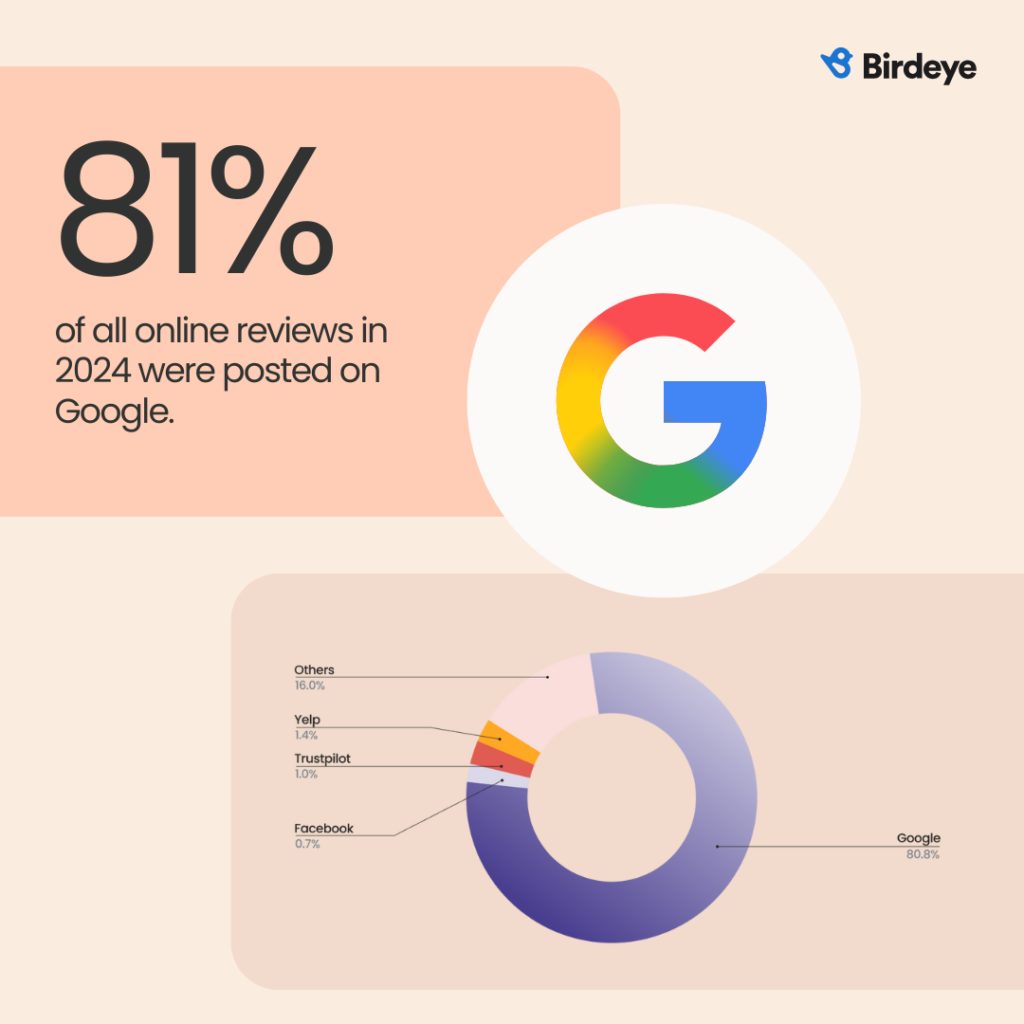Dental reputation management should lead to booked appointments, not just a wall of 5-star reviews that no one reads. Yet for many practices, that’s where the real gap is.
You’ve claimed your Google Maps listing and asked people to leave reviews, but you’re still not seeing consistent growth. If you’re not responding meaningfully, updating your practice information across online directories, or measuring what actually moves the needle, you’re just collecting stars, not patients.
The bigger issue is that most dentists’ online reputation management efforts stop at acquisition. They don’t fix the disconnect between satisfied patients and silent profiles or between unhappy patients and unanswered complaints.
In this blog, you’ll learn 11 practical, no-fluff strategies that use GenAI to do the heavy lifting.
Reality check 💬
A great star rating might make a great first impression, but that’s not what convinces someone to book. Real conversions happen when positive feedback feels personal, recent, and real — the kind of signal that stands out not just on Google, but on other search engines, review platforms, and your dental website.
Table of contents
- What is dental reputation management?
- Why is dental practice reputation management important?
- Benefits of reputation management for dentists and dental care practitioners
- 11 dental reputation management tips that actually bring in new patients
- Top dentist review websites
- Dental reputation management: Grow your dental practice with ease
- Frequently asked questions about dental reputation management
- Birdeye makes dental reputation management easier
What is dental reputation management?
Dental reputation management is the ongoing process of building, monitoring, and improving your dental practice’s appearance across review platforms, online directories, social media (including Google Maps, Facebook, Healthgrades, and even other search engines), and your dental website.
It’s not just about asking for reviews—it’s about ensuring potential patients find consistent, credible signals across every search channel.
Effective dentist review management helps you shape public perception with more than just star ratings. It means genuinely improving patient satisfaction, collecting feedback after visits by replying to reviews, correcting inaccurate practice information, and tracking how you’re performing across locations.
What are these 11 dental reputation management tips?
1. Claim and clean up your listings to show up where patients search
2. Automate review requests to turn visits into visibility
3. Use sentiment insights to uncover risks before they hurt your reputation
4. Respond to reviews like a conversation, not a chore
5. Use surveys to catch feedback before it turns into a 1-star review
6. Turn your website into a trust-building machine using patient reviews
7. Share your best reviews across social to reach more patients
8. Engage and convert website visitors instantly with AI-powered chat
9. Use omnichannel messaging to deepen patient relationships
10. Benchmark against competitors to spot hidden opportunities
11. Use dashboards to double down on what’s working
We’ll discuss them in detail in this blog.
Why is dental practice reputation management important?
Patients don’t just search for “dentist near me” anymore—they compare star ratings, scan responses to negative reviews, and even check how quickly your team replies to feedback.
According to Birdeye’s State of online reviews 2025 data, 81% of all reviews are left on Google, and nearly 1 in 2 patients have avoided a provider due to poor or unanswered reviews. For dentists, that means your online presence isn’t just a brand asset—it’s your most visible proof of care quality.

Benefits of reputation management for dentists and dental care practitioners
Here’s how online reputation management helps your dental practice stand out before your patients even walk through the door:
Gain a local edge within a few miles
Dental practices often compete within the same zip code, offering similar services. When pricing and location are equal, online reputation becomes the tiebreaker.
A higher review volume, happy patients with better sentiment, and consistency across online directories make a huge difference that can give your practice a clear edge, even for elective services like whitening or Invisalign.
Patient demand for overall dental services remains strong; however, it is a bit soft for optional services like orthodontics or whitening. Dentistry, being a local business, needs you to stay on top of the competitors within a one-mile radius. What works for us is focusing on review scores and volume to provide our locations with a competitive advantage in terms of SEO and reputation.
Jody Martin, Smile Brands
Build trust before patients ever meet you
Patients want signs of professionalism and empathy before committing. Replying to reviews, showcasing real positive feedback, and handling concerns from unhappy patients shows that you’re not just skilled—you’re accountable.
That builds emotional trust, especially in fields like dentistry, where anxiety is common.
Show up where it matters: Google, Maps, and more
Reputation impacts how and where you appear in search. Clean listings, updated hours, and active review profiles help you rank higher on Google Maps and other search engines.
And with 47% of consumers searching online for healthcare providers last year, your visibility isn’t optional, it’s essential.
“Birdeye made Steele Creek Pediatric’s positive patient experiences more visible to potential patients. Our patients would automatically receive a review request after an appointment, with a link to an external site like Google, and Facebook. Today, all three practices have over 700 total reviews. Prospective patients can immediately see hundreds of quality patient experience testimonials with a quick Google search. The number of new patients has doubled since the practice started with Birdeye.”
Steele Creek Pediatric
11 dental reputation management tips that actually bring in new patients

There are many ways to approach dental reputation management, such as managing a website, claiming business listings, investing in reputation monitoring, review management, boosting social presence, and improving patient experience.
Let’s explore these methods in detail in this section.
1. Claim and clean up your listings to show up where patients search
For most patients, the search for a new dentist begins on Google Maps, not your website. They compare reviews, hours, and locations across online directories, often within a one-mile radius. But if your listings contain inconsistent or outdated information, your practice’s reputation suffers, no matter how skilled your team is.
That’s why dental practice reputation management starts with visibility. With Birdeye Listing AI, practices can manage their listings across 50+ platforms, such as Google, Facebook, Healthgrades, and Apple Maps, from a single dashboard.
It ensures real-time accuracy in hours, services, and contact details—all essential signals Google uses to decide whether your practice deserves to rank locally.
Innovative Implant and Oral Surgery put this into practice. Despite delivering excellent care, they struggled to be discovered online. After onboarding with Birdeye, the team launched automated review requests, optimized listings across major platforms, and centralized their reputation data. The results were game-changing:
- They collected over 400 new patient reviews
- Their Google review volume increased by 60%
- And most importantly, their new patient inquiries doubled
This wasn’t just a digital facelift—it was a core shift in how the practice grew its referral pipeline. Reviews became their second-largest driver of new patient volume, right behind direct referrals from dentists.
A strong local presence fuels your entire dental reputation management strategy, and that starts with accurate, active, and easy-to-find business listings.
2. Automate review requests to turn visits into visibility
Most dental teams want more patient reviews, but few have the time to follow up after every appointment. Manually asking patients to leave a review isn’t just inconsistent—it’s impossible to scale. Moreover, most practices collect reviews randomly, missing out on valuable personal recommendations. That’s where dental reputation management software helps.
South Georgia Dental turned to Birdeye Reviews AI. As a growing group with multiple locations, they needed a dentist reputation management service that could standardize the review process, automate outreach, and give each office control over its online reputation.
Using Birdeye, they began sending automated review requests via text message right after appointments. Each message included a direct link to their Google reviews page, making it frictionless for patients to leave positive reviews while the experience was still fresh.
This proactive approach has encouraged patients to share their experiences, resulting in a 1673% increase in reviews.
Before Birdeye, South Georgia Dental had limited online visibility across its locations. Once they automated the review process, they saw remarkable traction:
- 13.9k new reviews generated across all sources
- Review volume grew by 5X in less than a year
- Their average star rating jumped to 4.9
- 1.5 million Google profile impressions
- 244.8k calls to clicks
For South Georgia Dental, this wasn’t just a numbers game—it was a shift in trust. Reviews became a reliable stream of personal recommendations, with positive reviews playing a critical role in how patients chose them over competitors.
3. Use sentiment insights to uncover risks before they hurt your reputation
High ratings are great—but they don’t always tell you why your patients feel the way they do. That’s where most dentists’ reputation management falls short. You might have plenty of positive reviews, yet still miss critical issues like scheduling complaints or wait time frustrations unless you’re tracking what people are actually saying.
That’s exactly what Aspen Dental discovered when they adopted Birdeye. As one of the largest dental providers in the U.S., Aspen knew that reputation wasn’t just about collecting more reviews—it was about extracting meaning from thousands of them.
Using Birdeye Insights AI, they began analyzing sentiment across Google reviews, surveys, and web mentions to understand patterns at scale.
What surfaced was eye-opening:
- They identified recurring concerns tied to specific locations, such as insurance confusion and front desk interactions.
- By catching these trends early, they launched targeted training programs, improving patient communication and reducing churn.
- Over time, sentiment in those flagged locations improved by 17%, and review volume rose steadily, not just in quantity, but in quality.
- Most importantly, they avoided brand damage by staying ahead of reputation issues before they turned into public-facing problems.
This is the future of dental reputation management: not reacting to reviews, but understanding customers’ sentiment and acting proactively. For multi-location brands, tools like Birdeye Insights AI provide real-time visibility into the health of each location’s practice’s reputation, no guesswork required.
4. Respond to reviews like a conversation
It’s one thing to collect dental reviews—it’s another to respond to them in a way that feels human. Many practices reply with templated lines, or worse, ignore patient reviews altogether. However, in online reputation management for dentists, silence is risky.
A single ignored dental complaint can overshadow dozens of positive reviews. Patients today expect to be heard, and how you respond tells them everything about your values.
That’s where Reviews AI’s assisted replies feature makes an immediate difference. You can personalize responses based on tone, rating, and context, without slowing down your day.
This approach became crucial for South Georgia Dental as their review volume surged. With multiple offices receiving feedback daily, manual replies weren’t scalable.
Using Birdeye’s GenAI reply assistant, they were able to:
- Respond to nearly 100% of reviews within 24–48 hours
- Maintain brand-consistent tone across all locations
- Reduce negative review escalations by preemptively addressing concerns
The result? Patients frequently referenced review responses during calls and consults—proof that people notice how practices control the conversation.
Thoughtful replies aren’t just damage control—they’re part of your reputation management service. A patient who feels acknowledged is more likely to return, refer others, and contribute more positive reviews.
Spread the good word – Supercharge your dental enterprise’s online reputation
Want to see the impact of Birdeye on your business? Watch the Free Demo Now.
5. Use surveys to catch feedback before it turns into a 1-star review
Some patients won’t tell you they had a bad experience, but they’ll show it by not coming back. That silence hurts more than a single negative review. And without a way to capture that feedback early, you risk losing trust without even knowing it.
That’s why smart dentists’ review management strategies go beyond public ratings and include private, proactive feedback using surveys.
With Birdeye Survey AI, dental practices can automate short, post-visit surveys via text message or email. These surveys help uncover how patients felt about their appointment, staff interaction, wait times, and more, before they vent on Google reviews or social media.
South Georgia Dental implemented this across its locations. By launching automated surveys through Birdeye, they gained deeper insight into patient satisfaction across services and providers.
This allowed their team to address recurring pain points early, resolve issues behind the scenes, and ensure patient experience was being monitored, not assumed. The result? More actionable data, more positive reviews, and more consistency across offices.
For multi-location groups and single practices alike, surveys offer a clear lens into your patient experience. And when people feel heard privately, they’re more likely to promote your practice publicly.
6. Turn your website into a trust-building machine using patient reviews
Your dental website isn’t just an information hub—it’s your digital waiting room. Patients decide whether to schedule an appointment within seconds, and what they’re looking for isn’t just services—it’s patient reviews that feel real, recent, and relevant.
With Birdeye’s review marketing feature, you can turn your site into a reputation engine. Review widgets let you display positive reviews from platforms like Google and Facebook directly on your homepage, location pages, or service-specific sections.
These widgets update automatically, are crawlable for SEO, and reinforce trust without patients needing to leave your site.
That’s exactly what Spring Sprout Pediatric Dentistry did. After embedding real-time reviews on their website using Birdeye, they noticed a visible uptick in engagement and appointment bookings. Parents exploring their services didn’t have to search elsewhere for credibility—it was already there, front and center.
This also gave their practice control over how its reputation was presented, ensuring the best parts of their patient experience were always on display.
For dental teams focused on dentist online reputation management, this isn’t a nice-to-have—it’s a conversion strategy. Your best reviews shouldn’t sit on third-party platforms alone. They should be helping you grow, right in your practice.
7. Share your best reviews across social to reach more patients
Today’s patients don’t just find dentists on Google—they find them on Facebook, Instagram, and even in local community threads. If your positive reviews only live on review platforms, you’re missing a chance to connect with people where they spend time daily.
That’s why top practices use Birdeye Social AI to turn real patient reviews into polished social media content—automatically. With a single click, you can convert new 5-star reviews into branded posts, complete with visuals and hashtags tailored to your location and services.
This not only boosts credibility but reinforces your practice’s reputation through a consistent presence across channels.
Dental practices like Spring Sprout Pediatric Dentistry have embraced this strategy, using Birdeye to amplify reviews across their web and social channels.
By integrating reviews into their Facebook content calendar, they saw increased post engagement from local parents and more patients mentioning “we saw your reviews on Facebook” during intake calls.
It’s not just about visibility—it’s about emotional relevance. When someone sees their neighbor praising your hygienist, it carries more weight than an ad ever could. It becomes a personal recommendation—one that feels trustworthy and human.
8. Engage and convert website visitors instantly with AI-powered chat
Missed calls. Abandoned forms. Unanswered FAQs. These are the silent killers of conversion for dental practices. If someone visits your dental website looking to schedule a cleaning and can’t get a quick answer, they won’t wait—they’ll move on to the next provider in search.
That’s where Birdeye Chatbot AI changes the game. It engages visitors instantly on your web pages, answers routine questions, books appointments, and captures lead details—even when your front desk is closed. It’s like having a 24/7 receptionist who never misses a beat.
It’s a critical part of reputation management for dentists, especially for dental teams stretched thin or managing high call volumes.
The chatbot can pass conversations on to your staff or continue via text message; this way, you never lose a potential lead. In addition, the entire journey feels personalized, modern, and effortless—exactly what patients want from healthcare today.
By improving responsiveness at this first digital touchpoint, you strengthen your practice’s reputation long before the first visit.
9. Use omnichannel messaging to deepen patient relationships
Patients want convenience, especially when it comes to communicating with their dental provider. If they’re forced to call, wait on hold, or repeat themselves across channels, frustration builds—and your practice’s reputation takes the hit.
That’s why reputation management for dentists should include modern, centralized messaging. With Birdeye Messaging AI, practices can manage all conversations—whether from text message, Facebook, email, or your dental website—from one unified inbox. You can tag teammates, set reminders, and even automate common replies to speed things up.
This matters more than ever. With the rise of Gen Z and millennial patients, asynchronous messaging is often preferred over calls. They want to reschedule an appointment during lunch or ask about insurance at midnight. Your ability to respond quickly across channels makes a lasting impression.
As a result, consistent, timely, and human conversations lead to more patients and stronger long-term loyalty.
10. Benchmark against competitors to spot hidden opportunities
When you manage multiple dental locations—or even just one in a crowded market—knowing how your practice performs relative to others is essential. You can’t improve what you don’t measure. And in modern dental review management, your own data only tells half the story.
With Birdeye Insights AI, dental practices can benchmark their online reputation management for dentists against competitors in the same city, region, or specialty. You’ll see how your Google reviews, response rates, and sentiment scores compare—and uncover exactly where to improve.
This approach made a massive impact for D4C Dental Brands, which operates more than 200 pediatric and orthodontic practices across 15 states. They needed more than a high-level view—they needed insights at the location level.
By adopting Birdeye, D4C Dental Brands was able to:
- Centralize data from thousands of reviews across every platform.
- Identify underperforming offices based on sentiment and review volume.
- Use AI-generated summaries to guide local teams on where to focus.
- And ultimately drive an increase in reviews with system-wide consistency.
What made it work wasn’t just the volume of feedback—it was their ability to use the data strategically. With reputation management service benchmarks built into Birdeye’s dashboards, D4C stayed one step ahead of regional competitors, flagged emerging issues, and empowered local teams to own their practice’s reputation.
If you want to improve your dental reputation management, stop guessing. Start measuring. Benchmarking isn’t about being perfect—it’s about staying ahead of the competition, one insight at a time.
11. Use dashboards to double down on what’s working
Collecting reviews, sending surveys, and replying to feedback is a great start. But the real power of dental reputation management lies in understanding what’s working—and doing more of it. Without visibility across channels and locations, your strategy stays reactive, not intentional.
That’s where Birdeye’s centralized dashboards come in. With real-time performance insights, dental teams can track:
- Review response rates
- Sentiment trends by provider or service
- Location-level comparison of Google reviews
- Survey feedback by category (billing, wait time, care quality)
- And channel-level breakdowns (SMS, web, Facebook)
From solo practices to DSOs, dashboards help teams identify reputation wins and weak spots instantly, so they can invest effort where it matters most.
Say one office is getting glowing positive reviews for pediatric cleanings, while another is getting mixed feedback about wait times. Birdeye lets you view this in one screen, assign internal action items, and even schedule recurring reports for your leadership team.
And because the platform integrates with other management software tools like Salesforce or your PMS, you can tie reputation data to actual business outcomes—like new patient inquiries or revenue by location.
Reputation management for dentists isn’t about intuition—it’s about insight. When your data drives your next move, your growth isn’t just possible—it’s predictable.
Top dentist review websites
Online reviews are a vital resource because they help patients make informed decisions about your practice even before setting foot in one of your offices. Since potential patients often read online reviews before choosing a dentist, you need to be represented on popular review sites like Google and Bing.
There are also review sites specifically for the dental industry. Here are some of the top dental review sites that you should consider:
- Healthgrades – Healthgrades is one of the most popular dentist review sites. Healthgrades pays attention to both positive and negative feedback, so potential patients get a complete understanding of your practice. In addition to patient reviews, Healthgrades also takes into account factors such as dental school performance and malpractice history. As a result, Healthgrades positions itself as an invaluable resource for anyone looking for a new dentist.
- 1-800-Dentist – 1-800-Dentist lets dental practices manage their reputations by giving them the ability to monitor and respond to patient feedback. The site also provides educational resources, such as articles on the industry and dental practice marketing.
- Dentistry.com – Dentistry.com lets dental professionals track their online reviews, interact with patients, and address any negative feedback. The website also offers a directory of dentists, so patients can easily find a practice in their area.
Dental reputation management: Grow your dental practice with ease
Patients rely heavily on online reviews and social media to choose the most trustworthy and valuable reputation management service provider, so positioning your business as the #1 choice is very important.
A strong dental reputation management strategy can help your business boost trust in your business, increase online visibility, and outperform your competitors.
Frequently asked questions about dental reputation management
The best way to handle a negative review is to address the patient’s concerns and apologize for their experience. You can also try to offer a solution, like a discount on their next dental cleaning. Also, avoid getting defensive or making excuses in your response. Doing so will only make the situation worse and could damage your dental practice’s reputation even further.
Yes, because potential patients often consult online reviews before choosing a dentist. Online reviews are a valuable resource because they give patients a complete understanding of your practice. Patients often consult online reviews before choosing a dentist, so it’s important for you to be represented on popular review sites. In addition to managing your dental practice’s online reputation, you can also use online reviews to improve your dental services.
Top dental directory listings include Google My Business for doctors, Healthgrades, 1-800-Dentist, Dentistry.com, Zocdoc, and Vitals. These platforms increase your practice’s online visibility by showcasing patient reviews, professional background, and accurate practice information. Claim and update these listings regularly to stay relevant and show up where patients search.
Dentists should make the process simple and timely to gain more Google reviews. Use dental reputation management software like Birdeye to automate review requests via text message or email right after appointments.
Birdeye makes dental reputation management easier
A positive online reputation doesn’t come overnight; it is an ongoing process that requires constant time, effort, and resources.
Effective dental reputation management is key to attracting more patients and building trust. Are you ready to enhance your practice’s reputation and grow with Birdeye?

Originally published









